Jane Roper's Blog
September 4, 2025
Absolutely Priceless, Utterly Worthless
Well, our kids are officially launched—we brought Twin A to RISD on Sunday and Twin B to Wesleyan yesterday. Bittersweet, exciting, sad, blah blah blah. The universe does not need another post about this rite of passage, so I’ll spare you. And I’ve already written (at length) about the fact that I’m less than thrilled by this whole empty-nest situation.
BUT I will say, in the spirit of looking on the upside: I have started seeing this phase as an exciting opportunity to de-clutter. Maybe this is a common instinct? The birds fly, then you look around and think: Jesus, there is way too much stuff in this nest. Clothes I haven’t worn in years, medications from the Bush era, the kids’ old Halloween costumes moldering in boxes in the basement, books I will never, ever read.
You see, I am a bit of a keeper. I’m a hopeless nostalgic and perennial hoper of things like: maybe someday I really will go back to playing the recorder. (I played in church, right up through high school, and was quite good. I still dream of finding someone to play the recorder duet solo in “Stairway to Heaven” with me.) And: Maybe someday when I try on that one particular top I’ve had for going on ten years I won’t think “yeah…no” and wear something else instead. And: Maybe one day I’ll have a grandkid who will be delighted by this mildewed Minnie Mouse costume from 2013.
And then there is the other force that is perpetually enabling my keeping tendencies: My parents’ crap.
As we all know, one of the super fun parts of adulting is being offered your parents’ (and sometimes your own) crap when they downsize and/or declutter out of consideration for those who will have to clean up after them when they depart this realm.
This is particularly fun if your parents are, like you, enthusiastic acquirers and keepers of things. My parents’ accumulation bent was was aided and abetted by the fact that they’ve always had lots of space. They used to own a ramshackle old farm in Maine in addition to our primary residence in Connecticut, and, later, owned and ran a whole kids’ summer camp, plus a small vacation rental property. That’s a lot of rooms to fill with crap.
My late father was particularly adept at accumulating things. This included everything from random brackets and hardware and slightly broken furniture found at barn sales or “free” piles on the side of the road that he thought might one day come in handy (Occasionally they did), to toys, sporting equipment, and VHS tapes at the town dump’s “swap shop” (Merry Christmas!), to old books—lots and lots of old books. More on those in a bit.
 A tiny fraction of his collection
A tiny fraction of his collectionMy mother, meanwhile, is a genealogy enthusiast and unofficial keeper of family heirlooms—aka the crap of previous generations. She is loath to let this stuff go out of family, which is why, for years, my brother and I have periodically gotten texts or emails from her, accompanied by pictures, saying things like: Do you want one or more of these neat old horseshoes? They’re from from Gram Gram’s farm in Ireland. Or: Do either of you want this afghan? It’s one your great grandma Eulalie made when she was at a sanitorium “drying out.” Or: Any interest in this lamp? I think Dad picked it up off the side of the road.
And then there’s my own crap that has been offered back to me over the years: Christmas ornaments I made in nursery school, the framed Annie and Peter Pan Broadway posters that hung in my childhood bedroom, my baby teeth.
Eight times out of ten, I say no thank you. (See: Baby teeth.) But, well, that’s still a lot of crap making its way into my life.
Some of it I actually have a use for, like my grandmother’s china and silver and my great, great aunt So-and-So’s crystal glassware. The fact that these things come from family is a substantial part of their beauty to me, and of the pleasure I take in using them exactly twice a year.
 That’s Grandma’s damask tablecloth, too.
That’s Grandma’s damask tablecloth, too. But sometimes I say yes to the crap I’m offered simply because I don’t like the thought of it being consigned to oblivion. If it’s interesting or unique or has sentimental value or even just screams “history!” (e.g. an ashtray from the Red Cross Club in Naples where my other grandmother worked during the war) it’s hard for me to say no.
Which brings me to my father’s books.
My dad was a major bibliophile, and fancied himself a bit of a collector. (He fancied himself a lot of things, only some of which he actually was, but that’s a topic for another day.) Over the years, he collected dozens of old books from yard sales, antique shops, used bookstores, and, of course, the glorious Traveler Restaurant in Union, Connecticut, where every customer gets to pick out a book from the vast and eclectic collection after they finish their club sandwiches and cole slaw.
 If you’ve ever traveled between Massachusetts and Connecticut on I-84, you’ve seen this sign.
If you’ve ever traveled between Massachusetts and Connecticut on I-84, you’ve seen this sign.Recently, my mother asked me if I wanted to go through my dad’s book collection and see if there was anything I wanted to keep or try to sell. Obviously I said yes, because I am me.
There were three moving boxes full of books, most from the late nineteenth through mid-twentieth century, ranging from McGuffey’s Fourth Eclectic Reader (1879) to Somerset Maugham’s The Razor’s Edge (1944, multiple copies—it was one of my dad’s favorite books—including a first edition) to his 1953 Wolf Scouts guide.
Most of the books are in decent condition, and many of them are quite beautiful.
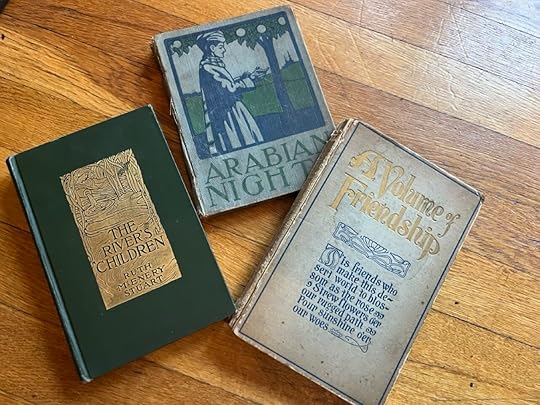
You’d think at least some of them would be valuable. But even the ones that seemed most promising—a mint-condition, late 19th century copy of The Song of Hiawatha, for example—really aren’t worth much, according to my cursory internet research. Thirty, forty dollars tops. The first edition Razor’s Edge is the only one that might be able to fetch a few hundred bucks.
Still: there was never any question that I would keep them. Some of them, anyway. So I sorted through and picked out the ones that called to me—the most beautiful, the most intriguing, and/or the coolest in a kitschy sort of way—like this delightfully pulpy novella (also by Somerset Maugham):
 I really hope she falls on her knees. Bet he does too!
I really hope she falls on her knees. Bet he does too!Will I ever actually read any of them? On some lonely, rainy, empty nest Saturday afternoon will you find me on the window bench with the cat in my lap and a cup of coffee on the windowsill, reading The Story of San Michele or Arabian Nights? (Or, more likely, The Beachcomber?)
Or will they just sit on the shelves for a few decades, only for me to eventually foist them upon my own children—or perhaps my theoretical mildewy Minnie Mouse grandchild?
I don’t know. But I’ve decided to stop wondering what the point is of keeping them. I just like knowing that they exist, and that they are part of my world. Turning the pages, smelling the old book smell, scanning the text—the cadence and phrasing so different from modern day, yet still completely immediate and human…it’s satisfying and sad and a little bit magical. Maybe the Germans have a word for it. Altenbücherntraurigkeitmagiefreude?
More than any other sort of artifact (e.g. pill-popping Eulalie’s afghans), old books feel to me like portals to the past, and to the lives of actual, individual people: the authors and illustrators and designers who created them, the agents and editors and printers who brought them into the world, the readers who scrawled their names on the inside covers. All of them wearing fun, old-timey clothing, and saying things like “Say, now, that’s one swell book.” And probably also having very bad teeth.
It wasn’t easy, culling the collection. But I managed, and now I’m left with two moving boxes of rejected (but very cool) books. Do I bring them to a rare / old book buyer? Offer them up for free on Facebook Marketplace? Honestly, I feel more inclined to give them a proper and dignified burial in the back yard: Here lie the remains of countless hours of human imagination, creativity, toil, pleasure and pain. Ashes to ashes, pulp to pulp.
Or maybe you want them? I’m quite serious. If you’re local to the Boston area, or feel like taking a road trip, they are yours for the taking: worthless and priceless, like so much that is good in this world.
All posts on my Substack are free, but writing is how I attempt to make a living. If you like what you read, please consider leaving me a one-time tip or upgrading to a paid subscription to support my work. Or, consider buying my book. Thank you as always for reading!
P.S. I’ll be teaching a 3-hour virtual seminar on Writing With Humor, via GrubStreet, on November 22. Check it out and register now! Become funny funny ha ha!
P.P.S. I’m continuing to build my coaching and editing business. If you or someone you know has a completed novel / memoir / nonfiction mansucript ready for professional review, or would like coaching, accountability and feedback as they work on a writing project, please reach out!

August 14, 2025
Dear Diary: Billy Joel Rules
This post is dedicated to my high school friends. And also Calvin Hennick.
OK, people. Because I love you, and because some of you, like me, may have recently watched the new Billy Joel documentary, AND because I apparently love humiliating myself, I’m going to tell you about the first concert I ever went to: Billy Joel. The Storm Front Tour. 1990.
Actually, I’m not going to tell you about it. My fifteen-year-old self is. Because she wrote about the experience in excruciating detail, taking up a full six-and-a-half pages in her diary, including the inside back cover, plus a sort of valedictory (to the diary), Billy-Joel-themed word art piece:

I am already totally embarrassed. If you want to unsubscribe, I understand.
Those aren’t necessarily my favorite Billy Joel songs up there, mind you. I actually kind of hate “Goodnight Saigon.” It was really just meant to be a sort of razzle-dazzle, visual montage of abundance. Imagine animated graphics with the song names popping out here and there over concert B-roll. You seeing it now? Yes? Welcome to my 15-year-old mind.
So, um, yeah, I was a big Billy Joel fan in high school, to put it mildly. As were a lot of my fellow teens. (I would absolutely need two hands to count the number of my classmates who used “I’d rather laugh with the sinners than die with the saints” as their yearbook quote.)
I am still quite a fan, even though my husband makes fun of me for it. I get it though. Billy Joel is an incredibly talented songwriter and performer, and a few of his songs are among my very favorite songs, period. (She’s Got a Way, anybody?) BUT there is something iredeemably uncool about the guy, which taints his music with a little bit of ick.
Oh sure, he can wear sunglasses and jump off of pianos, he can pretend to be a working class rogue (Uptown Girl), he can do a weird tough-guy voice (Big Shot) or try to make us think he rides a motorcyle (Movin’ Out). But he never quite pulls it off. And yet, you get the sense he thinks he pulls it off. Which is one more reason he is not and will never be cool.
But I like his music, dammit. And I refuse to be ashamed. If I were to be ashamed of anything, it might be my rhapsodic, blow-by-blow description of his January 1990 performance at the Hartford Civic Center.
I would never subject you to the entire diary entry. But here are a few choice, representative excerpts.
We begin thusly:
We went to the concert. I’m depressed now. My life is so meaningless. Actually, I’m less depressed than I was the 1st and 2nd days afterward. Anyway. During school the day of the concert I was so excited. Kurt K. in math class was telling me all about it and how great it was. After school I rushed to do some homework. Then I got ready - changed into my white & red striped shirt, jeans, boots, fake pearl necklace & earrings. I packed money enough for 2 t-shirts and dinner, my ticket, and a comb into the inside pocket of my jacket. At 3:45 I left for Joanna’s. Me, Jane S. and Joanna sat in the front seat of their van, Meg, Harry and Heather in the back, Meg’s sister Kara in the front.
Are you not riveted??
Apparently I wanted to relive every single detail of the experience through the journaling process—and also give myself the opportunity to revisit that magical night whenever I wanted. (Omigod, remember how you BROUGHT A COMB?? And how you and your friends were all IN VARIOUS SEATS IN THE MINIVAN??)
Also, let’s hear it for the fake pearls.
Other important pre-concert details I covered:
We had dinner at Wendy’s
I bought two concert t-shirts at $20 each, one for me and one for my brother
My friends and I bought lighters to wave during the slow songs
I bought a peanut butter Twix
Keith and Dave made fun of my bangs — probably the fact that they were, per usual, shellacked within an inch of their life with hairspray, such that they were essentially a single feathery sideswiped bang unit.
I also provided this handy diagram to indicate where each person in our group sat. Because someday I would want to know this.
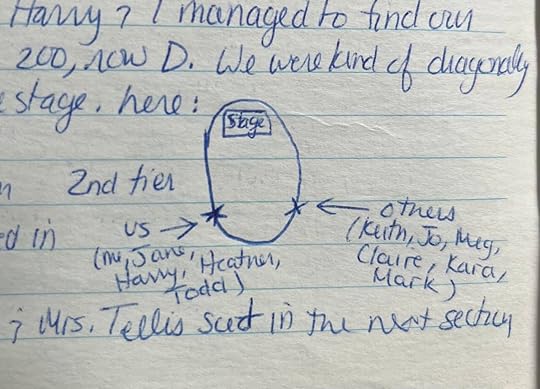
But enough with the build-up. Let’s get to the account of the concert itself, shall we? Because here’s where things get really intense. And cringey.
I gotta say though? The writing itself is pretty good. Although I do a weird thing where I alternate between referring to Billy Joel as “Bill,” “Billy,” “Billy Joel” and later, “Joel.” Like I’m a Russian novelist.
All the seats gradually filled. Then smoke started pouring from behind the stage. Thunder sounded. The lights went off - we could just make out Bill & the band. They turned on the lights first on the band, then on Billy Joel sitting at his grand piano. The saxophonist ‘phoned for a while. He did ‘Storm Front’ first - it was hard to believe it was actually him! [Ed: Substack doesn’t let me underline, so I’m using italics instead. Not quite the same effect.]
He talked to the audience, which was great, everyone applauded & screamed no matter what he said. He even announced the lottery numbers! He then talked about how the Sound was polluted, giving fishermen trouble & sang Downeaster Alexa.
I should have added that song to the attempting-to-be-cool list: Billy Joel pretending to be a down-on-his-luck Long Island fisherman. (It is a catchy tune, tho. Like all of them.)
Let’s skip ahead a little bit now, to the part where it gets practically orgasmic. If you ever needed incontrovertible proof that the intensity of experiences is heightened in the teenage mind, here it is:
When ‘We Didn’t Start the Fire’ came on everyone stood up. No one in our section was standing [ed: What?] so we did and sang every single word! From then on we were up - Uptown Girl, Big Shot, Still Rock & Roll, Only the Good Die Young, I go to Extremes. Jane, Heather & I were going nuts! We kept just screaming the words and screaming & clapping & dancing. The lucky people in the front row were grabbing at his feet - a beachball was getting bounced around the audience and on stage where he’d kick it and spin it around. He danced - or tried to - but it was so cute & everyone loved it no matter what he did!
Oh ye gods! Take me back to that time when all was new, and life shone with the light of a thousand suns, and a beachball being kept aloft in a crowd was worthy of delighted mention in one’s diary!
We never knew we could want more than that out of life.
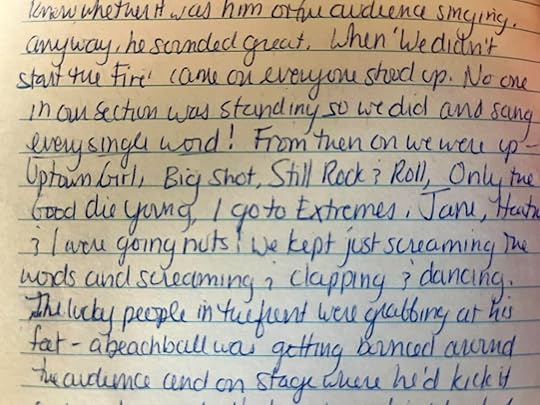
Ah, but there is a downside to it all: The sucking void in one’s soul that remains after the rapture has ended.
When I got home at 1:00 am the house was deafeningly silent. I slept in for period 1 the next day. That day & the next when I was at home I just listened to Joel’s music. [Ed: see?] It was so depressing! All the excitement, the noise, all these people all together - 10,000 of us loving Billy Joel, singing along, hearing him actually singing all these famous songs. It left this unfillable void in me. Jane S., Jo & I all felt this way, convinced that nothing could make us happy now. That was it, and now there was nothing to look forward to. Just the dull monotony of our existences.
I suspect this feeling of existential emptiness lasted at least until the weekend, when we most likely all got together in someone’s finished basement and ate Doritos and watched whatever we’d rented at Blockbuster.
Still…thinking back over the thirty-five years since that concert, I wonder: have I ever experienced that specific, rhapsodic sort of joy again? Have I ever felt quite so giddy, or so swept up in the collective effervescence of a crowd?
I don’t know that I have. I think maybe it’s only possible when you’re fifteen.
Thanks, Mr. Joel, for helping to make it happen. From one uncool person to another.
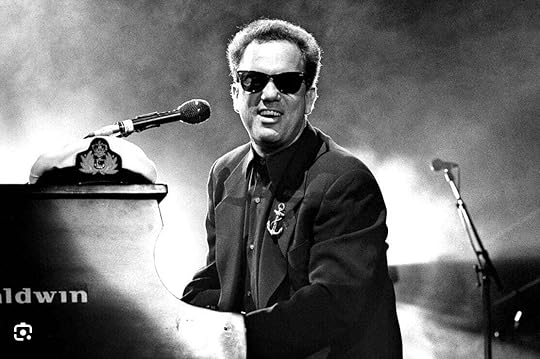
All posts on my Substack are free, but writing is how I attempt to make a living. Plus I’m saving up for Billy Joel concert tix. If you like what you read, please consider leaving me a one-time tip or upgrading to a paid subscription to support my work. Or, consider buying my book. Thank you as always for reading!

July 22, 2025
From the Upper Verandah deck to the edge of the cliff
Well, hey there! It’s been a while. I was off on an Alaska cruise with my mom, and it’s taken me a minute to catch up on work, etc., and figure out what to write.
In my last post, I shared my apprehensions about the whole cruise thing (as well as my admiration for Vicki Stubing’s hair). As I expected, there were aspects of the experience that I did not particularly like—especially the number of other people who had the audacity to be on the ship with us: 1,900 passengers and 800 crew members, to be exact. (Apparently this is on the small side in the cruise ship world. Shudder.)
 Our “small” ship in port
Our “small” ship in portBut as also expected, I had a pretty great time overall. The scenery was stunning (glaciers! mountains! JK Rowling’s big stupid yacht!), the shore excursions were varied and fun, and I found that I dug the overall vibe and feel of Alaska. Kind of like Maine on steroids.
We saw, like, all the wildlife, including the biggies (literally): humpback whales and, during the land portion at Denali National Park, grizzly bears, moose, and caribou. We didn’t see any salmon, as they hadn’t quite started running upstream yet, but we sure ate a lot of them. We also saw sled dogs, none of which we ate.
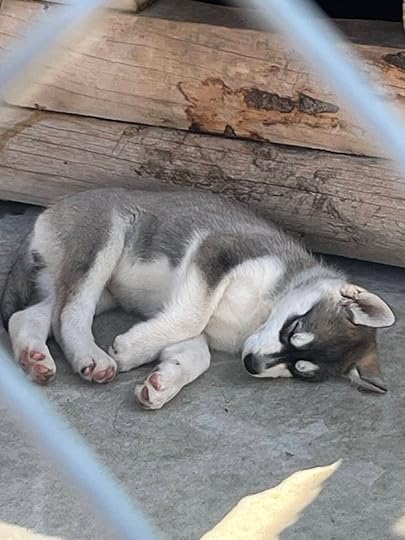 Alaskan husky puppy! Did not eat.
Alaskan husky puppy! Did not eat. As for the ship itself: the service was excellent, the facilities were great, our stateroom was lovely, the food was quite good, and the programs on Alaskan wildlife, culture, etc. were informative and entertaining.
But there were aspects of the cruise—and I guess cruise culture?—that I found baffling. Like: What’s with the pricy jewelry? There was a store on board that sold all kinds of very expensive, heavy-on-the-gemstones jewelry, and hosted various promotional events. (“Tonight, guess the weight of the jewel-encrusted sea otter,* for a chance to win a $500 gift card!”) Also on board: a gallery full of paintings ranging in quality from mediocre to godawful, for sale at exorbitantly high prices.
Maybe there’s a special thrill to buying expensive things while on ships. I wouldn’t know; all I got was a $15 hat from the gift shop after I left mine in the van on the way back from our whale watch in Juneau.
It’s also strange to me that anyone would choose to do cosmetic procedures like getting fillers or botox while on a cruise (or any vacay for that matter). A facial I get. A massage I get. (And got!) But “Think I’ll address these marionette lines right after the mahjong meet-up!” Weird. But hey, cruise your own cruise, kids. I’ll be out on the deck with my binoculars and a cup of hot Dutch mulled wine, hoping for orcas. (I didn’t see any orcas.)
 I see your on-board botox and raise you one glass of bisschopswijn
I see your on-board botox and raise you one glass of bisschopswijnSo. Yes. Cruise = good, though I don’t think I would do one to any other destination.
The hard part has been coming home.
Like many people, I have a tricky time readjusting to real life after long trips. In fact, the older I get, the harder I find it is. But this time has been especially rough, in part because instead of landing back in the middle of a solidly settled “normal” life, I feel like I’ve been deposited onto the edge of a cliff.
Correction: I feel like I’ve been living on the edge of a cliff for a few months now. Being away from it for a while, among the wildlife and glaciers, and then coming back just makes it that much clearer that this is where I am.
Almost exactly six weeks from now, we’ll be dropping our kids off at their respective colleges. This makes me immensely sad. There’s no other way to say it. I’m thrilled for them, of course, and I know they’re ready. But I’m not. There will be upsides, I know, but I also really like the phase of life I’ve been in for the past 18+ years.
I don’t know what’s at the bottom of this cliff I’m about to walk off of, or how hard the impact of landing there will be. I could be waddling along like a flattened Wile E. Coyote for a while. Don’t laugh when you see me. Do ask me if I want to go get a drink.
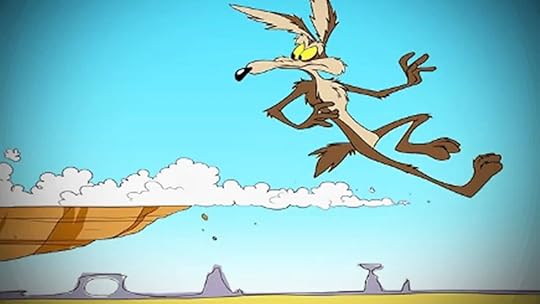
The kids' impending departure isn’t the only thing causing this cliff-edge sensation, though. My career is shifting, and I’m not quite sure where it’s headed. Our society is on the brink of huge changes, economic and otherwise, with the emergence of AI, and none of us quite know what the full ramifications of that will be. (Many of them, I fear, will not be good.) Living under the Trump regime, meanwhile, I often feel like we’re on the brink of a point of no return from the America we used to be. Maybe we’ve already passed it.
And, of course, it’s summer, which is always a slightly unsettled and discombobulating time, when routines are out the window.
Oh yeah, and menopause. I’m on the edge of that, too.
 I much preferred being on the edge of this cliff. (Inside the train.)
I much preferred being on the edge of this cliff. (Inside the train.)Liminality, limbo, standing on cliff edges, being at sea (as opposed to being on the sea). It’s uncomfortable, and I wouldn’t choose it. I haven’t chosen it. But here I am. So I’m just trying to take it moment by moment, take solace in what’s solid, have faith (the coyote always un-flattens eventually!), and not freak the fuck out. I think for now, it’s all I can do.
All posts on my Substack are free, but writing is how I attempt to make a living. If you like what you read, please consider leaving me a one-time tip or upgrading to a paid subscription (As little as $4.16666 a month! Cheap!) to support my work. Or, consider buying my book. Thank you as always for reading!
*It wasn’t actually a sea otter, it was something else, I don’t remember what. A jaguar, maybe? I did, however, find this picture of a sea otter sculpture (not jewel-encrused) that is apparently part of the decor on another ship in the Holland America fleet. And I saw lots of actual sea otters during the cruise. They are extremely cute.
 art
art

June 21, 2025
A supposedly fun thing I'm about to do
Think of this post as a “before” picture — a picture of me, about to go on a cruise to Alaska with my mom. Today.
She and my dad were planning to go on an Alaska cruise back in June 2020—it was booked and everything. But they never had the chance because, well, my dad died. (Although even if he hadn’t died at that particular juncture, the cruise would have been canceled anyway on account of it being June 2020.)
An Alaska trip has remained on my mother’s wish list ever since, and I am her traveling companion of choice, so, off we go!
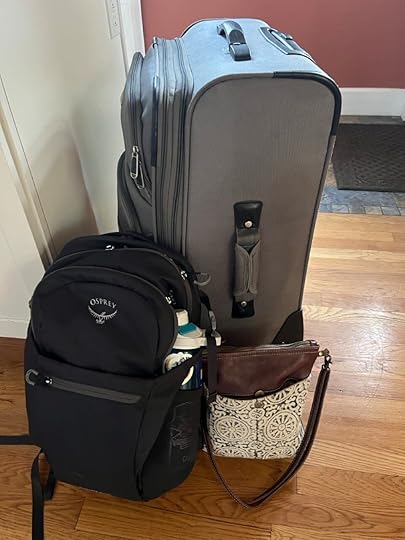
Let me preface what’s to come by saying that I am very excited for the trip, as Alaska is on my wish list, too. (I don’t much like the phrase “bucket list.”) Plus, I’ll take pretty much any chance I can get to travel. I am also incredibly grateful to my mother (and late father) for paying for the better portion of the trip.
But here’s the “but” part: Going on a cruise has never, ever been on my wish list. Correction: going on a cruise on the ocean in a giant, Love Boat-style cruise ship has never been on my list. (In spite of how much I enjoyed watching The Love Boat as a kid, and wanted to be Vicki Stubing. Or at least have her haircut.) I do not love boats, nor do I love travel of the uber-commercial, uber-touristy variety. Buffets, lounge acts, motorcoaches—not my jam. I’m a more of a two-star-pensiones, hole-in-the-wall restaurants, public transportation and wandering aimlessly for hours traveler.
I am not a complete cruising virgin, mind you. Our family did a river cruise in central Europe last summer, and it was phenomenal. But that was a very small boat. (No, not boat; ship. They were very insistent on that.) It was not a skyscraper laid down sideways on the water. There were only around 200 passengers on board instead of 2000, and zero slot machines, med-spas (did you know you can get botox on cruises??), indoor pools, dance parties, or fitness centers. I think there might have been a stationary bicycle and some free weights somewhere, but I never sought them out. Thousands of steps walking around various European cities and calisthetics on the deck with Milosz the frightening Serbian fitness coach were good enough for me.
On the river boat ship, land was always visible and very close by, which my psyche appreciated, and walking on and off the boat while it was in port was as easy as walking in and out of a CVS, complete with automatic sliding doors. And while we were, regrettably, burning fossil fuel as we chortled up the Danube, this somehow felt less….unsavory…than what Holland America’s MS Noordam will be doing while we’re aboard: burning much larger quanities of fossil fuel while cruising past glaciers that are retreating as a result of climate change, and spewing fumes into / disturbing the habitats of the whales and seals and other wildlife we will be ooohing and ahhhing at from the deck.
If it were up to me, I’d have chosen a cruise on a smaller ship, with a smaller carbon footprint, responsibly sourced local food, and other such things that would allow me to delude myself into think I’m not part of the problem as I watch endangered sea otters frolic in microplastic-polluted waters. However, those kinds of cruises are much, MUCH more expensive. Shocking.
The other thing that’s making me apprehensive about this adventure, I confess, is the fact that it is going to take me out of The Bubble. As in, the bubble of mostly liberal (or at least liberal-ish) people among whom I live and work here in the Greater Boston area. Not that there aren’t any Trumpers around. Some live on our street, in fact. But I don’t have to be up close and personal and trapped on a vessel at sea with them for eleven days. I do not to have to inadvertently overhear them talking about illegals in the line for waffles or chuckling at the other end of the bar about blue-haired they/thems.
Am I completely fabricating these scenarios? Yes, yes I am. They are, I’m sure, very unlikely. MAGA hats and “I stand for the national anthem” T-shirts aboard are probably unlikely too.
The truth is, it’s not even so much the chance of hearing or seeing overt evidence of Trumpism among my fellow passengers that makes me feel grumpy; it’s just knowing it’s there—that many of my fellow glacier-gawkers (all of whom will no doubt look and act like perfectly nice people) will have voted for the felon.
This assumes, of course, that the passenger population—which I’m guessing will mostly be white, middle- to upper-middle class people in their fifties and older—is representative of that voting population in the United States writ large. We could do a little bit of fiddling and futzing here with assumptions about who chooses to take a cruise to Alaska, and what their political persuasions might be. But, bottom line, this trip will probably be the longest time I will ever spend in an enclosed space with so many people who voted for fascism.
As I write this, I’m feeling better about being on a very large ship.
To folks reading this who live and work among a politically diverse population, you probably think that mine are the rantings of a crazy person. But I assure you, I am not crazy. I’m just a coddled, liberal coastal elite who enjoys not having to spend extended periods of time with people who are OK with masked, plain-clothes thugs snatching brown people off the streets. Or who think it’s reasonable to accuse qualified women and people of color of being “DEI hires” while installing some of the least competent people on the planet to run the government. Or who think it’s totally cool to cut funding for scientific research and humanitarian aid, or to strongarm universities. Or who think trans and nonbinary people like my own child are a threat to…anything or anyone whatsoever. Or who aren’t even fucking paying attention, and/or don’t care.
I just don’t want to go on vacation with those people, you know?
I hate that this is the reality of living (and cruising) in America today—the constant, just-beneath-the-surface awareness of political division. The constant wondering: which side are you on?
It didn't used to be this way. Oh sure, I hated Dubya and the Tea Party. I’ve always been an ardent liberal, with strong political opinions. And yet I think I could have put politics aside to bond with a family of Bush voters on a whale watch or at a night of 80s music trivia on the Lido deck.
I don’t know if I’m capable of doing the same with known Trump voters. The moral differences are too stark and the stakes of what is happening are too high. Civility may be the best I can muster. And even that may be a stretch.
But maybe my apprehension about all this—the cruise life, the fossil fuels, my fellow passengers—is overblown. Maybe I will be so enraptured by the scenery and so transported by the endless food and alcohol that I won’t feel stressed out about the fumes being spewed or the food being wasted, or angry about the retirees watching Fox News in the stateroom next door.
Maybe.
What I know for sure is that I’m grateful for the adventure, and for the time with my mom.
I’ll let you know how it goes.

All posts on my Substack are free, but writing is my profession. If you like what you read, please consider leaving me a one-time tip or upgrading to a paid subscription (As little as $4.16666 a month! Cheap!) to support my work. Thank you as always for reading!
P. S. Give yourself three points for literary coolness if you caught the reference in this title.
P.P.S. I will proably be posting some pretty kickass Alaska pictures on Instagram over the next couple of weeks if you feel like following me there.

June 9, 2025
I'm a loser, baby.
OK, first things first: When I looked up the lyrics to Beck’s Loser (that’s the song I’m quoting in the title of this post, Mom) to see if there were other tidbits I could borrow, I was bowled over to see that the line just before “I’m a loser baby, so why don’t you kill me” is “soy un perdedor”— “I’m a loser” in Spanish. I never knew what the hell he was saying, but never bothered to look it up. Por qué did he throw a random Spanish phrase in the middle of the song? We’ll never know.
I’m not actually a loser. Not in the sense that I’m a lame-ass sad sack. Au contraire. What I mean is that lately I feel like I’m losing a lot of things. Or am about to. And I don’t mean my good pens—the Uni-Ball ones—although they are often elusive. I mean people. Routines. Normalcy. Collagen.
Seems like in the first half of your life, you gain and gain and gain—experiences, knowledge, teeth, scars, height, people. So many people—including, sometimes, ones you grow in your own body! But once you reach middle age, there starts to be a hell of a lot more losing. (Except when it comes to belly fat.)
Last week, my kids graduated from high school. And while I’m certainly feeling the gravity of this milestone on a broader level—the ending it represents, the new beginning it signals—I’m also aware of the many little losses that will come in the wake of it. Bake sales and open houses. Concerts and plays and proms. Homework papers and textbooks on the dining room table. Permission slips. (A welcome loss). The need to occasionally buy posterboard. Chatting with other parents at school events.
And let’s not forget the emails! Why, just a couple of weeks ago, I got an email from the superintendent saying that cucumbers involved in a recent salmonella recall may have been distributed to over 400 school districts in New England, including ours, and that the district had taken immediate action to remove all cucumbers from the recalled lot, as well as any others currently in rotation.
This is exactly the sort of treasured, parent-of-kids-in-school moment I’m talking about: being informed about deadly bacteria and the fate of rotating cucumbers.
At this point you may be thinking: Dios mio, maybe she *is* sort of a loser. But all those little losses, and cucumbers, add up to something very real. And when I think about the fact that it’s all vanishing, it’s a little punch to the heart.
 I can’t post a pic of my kids at graduation or they’ll kill me, so here’s me—in one of their mortarboards, with my head looking weirdly large because of the angle—and my husband (with his eyes closed. Sorry, honey).
I can’t post a pic of my kids at graduation or they’ll kill me, so here’s me—in one of their mortarboards, with my head looking weirdly large because of the angle—and my husband (with his eyes closed. Sorry, honey).More and harder heart-punches lie ahead. Like the kids actually leaving for college. Like the accelerating death of the generation ahead of mine: parents and aunts and uncles and family friends I’ve known since birth. You know—the grown-ups. And Paul McCartney. Paul McCartney is going to die, and where does that leave us??? (Ringo too, but, well.)
There’s the ongoing sense of loss (and anger) that I’ve been feeling as I see the current administration and its supporters going after so many of the things that make (made?) our country great: checks and balances, due process, science, academic freedom, diversity, stable alliances. And decorum! I mean, I am no prissy ole pearl-clutching priss, but reading about the the public Trump / Musk slap-flight last week I just kept thinking: Could we get a little fucking decorum back in the executive branch?
So much is being lost, thanks to those actual losers.*
I think my recent feelings of sadness and anxiety around AI also have to do with a sense of loss. Writing has always been my superpower. I’ve been really good at it since an early age (just look at my killer poetry!) and over the course of my lifetime it’s become an increasingly bigger part of my identity. It’s also, in the case of copywriting, how I’ve always made my living. But now, with more and more people “writing” with AI (or thinking they can) especially in the corporate realm, my superpower doesn’t feel quite so super anymore.** And that’s a loss.
I guess I’ve also been feeling a sense of loss with regard to our digital existence more generally. I miss seeing people reading books and magazines on trains and in waiting rooms, instead of staring at their phones. (I miss me consistently doing the same.) I miss snapshots and photo albums. Postcards and letters. I miss seeing the infinite variety of people’s cursive handwriting, and the little window it offered into their nature somehow. I miss the feeling that came with knowing that millions of other people were watching the same TV show as you, at the exact same time.
I think what makes me saddest about this is the fact that these things are all still available, all still possible—yet we’ve moved away from them. They simply aren’t valued as much anymore.***
But I guess every middle-aged person who has ever lived goes through this sort of thing, don’t they?
Why did everyone stop wearing knee breeches? Do we no longer value the sight of a man’s calves? The curve of the musculature? The sharpness of the shin bone? Trousers do keep the legs warmer, I grant you, but at what cost, my good man? AT WHAT COST?
Sigh.
So, here’s the part in the post where I suppose I should talk about all the things I will undoubtedly gain in the years ahead (in addition to belly fat). New experiences and relationships and perspectives and projects and liberally red-pepper-flaked meals and blah blah blah blah blah.
Yes. But the losing’s still hard.
OK, fine. I feel a little guilty hitting you people with such a melancholy post on a Monday. So in conclusion, here’s a picture from the baguette contest judging tent at a French-themed street fair in Cambridge that the mister and I went to yesterday, as I am a Francophile and lover of bread. Just as a reminder— to myself as much as anyone—that the world is full of things that are wonderful and good.
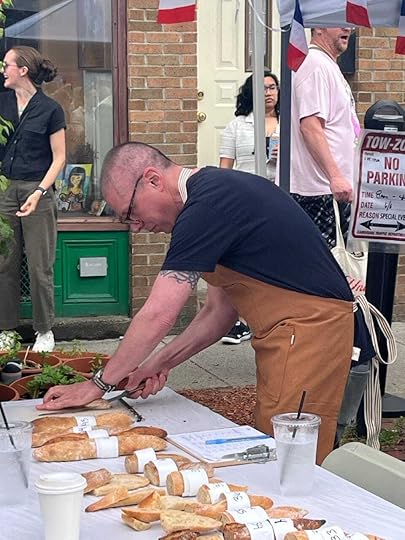
All posts on my Substack are free, but writing is how I make my living. If you like what you read, please consider leaving me a one-time tip or upgrading to a paid subscription (As little as $4.16666 a month! Cheap!). Thank you as always for reading!
* If you feel the same way, find a No Kings protest near you to attend this Saturday, June 14. If you’re in the greater Boston / North Shore area, you might , which I’ve been helping to organize.
** I do not, by any means, think that generative AI can write as well as I do, and luckily, it simply can’t write personal writing of the sort I do here, on account of it not being a person. I don’t think it will ever be able to write truly good novels either. Crappy ones, sure. But there are already people who write those, too. :-D
*** Thank you to a climbing friend of mine, who may be reading this, who helped me articulate this notion of things we value no longer being valued in our culture / society, especially by younger generations, and the grief we feel as a result.
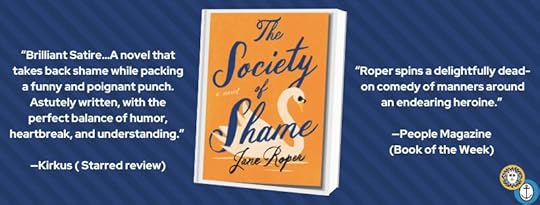
May 23, 2025
You look like you could use a coach.
As I touched on in my last post, the miracle that is generative AI may well make many of the services I offer my clients as a copywriter obsolete within the next two weeks several years. But as many people informed me when I shared that piece on LinkedIn, where it went kinda viral, I need to adapt, lest I be trampled under the wheels of progress!
O progress! That great and wonderful and not at all morally complex thing to which we must all bow! We are powerless in the face of it, and therefore we must embrace it wholly and without question—economic, cultural, spiritual, and environmental consequences be damned!
Srsly, tho. I get it. AI is here to stay. It’s going to transform the work world completely over the next few years, across every industry, and we have no idea what that’s going to look like. I, for one, am not thrilled about this, but what can I do?
So, in the spirit of not ending up having to be a cashier at Trader Joe’s—not that there’s anything wrong with that; I’d just end up eating way too many of their crackers—I’ve decided that I should make the time-honored career move of the not-quite-sure-what-else-to-do: Coaching.
Yes, that’s right. I am now supplementing my writing income by offering five different coaching services (for starters). I am an enthusiastic and empathetic coach, highly skilled at helping my clients define and achieve their goals, and find greater meaning and satisfaction in the process. You’re gonna love it.
Don’t see the coaching service you need here? Please describe what you’re looking for in the comments or contact me. I may be able to help.
Dessert coaching. This is where I help you develop and execute an actionable plan for making a ton of desserts—cookies, pies, cakes, tarts, bars, puddings, etc. I’ll provide you with strategies for researching the millions of dessert recipes available, help you determine which ones to make based on what sounds good to me, and work with you to devise an ambitious yet realistic baking schedule. You’ll stay accountable to your dessert-making goals by providing me with a sample of each dessert you make at the agreed-upon deadlines. (Note: Only appropriate for people who are already really good at making desserts.)
Reading coaching. Want to read more books? Hell yes you do! I’ll help set your reading goals for the year, devise a reading schedule, and choose which books to read, based on your specific interests and preferences. For example, if you say you like “really good books” I might recommend my book and books written by my friends. I’ll help you stick to your reading plan with helpful check-ins and motivational techniques such as texting you every night at nine p.m. telling you to get the hell off Instagram and pick up a book for God’s sake. Optional: I will give you fun assignments, like making dioramas based on the books you read.
Hiking snobbery coaching. If you’re a beginner or intermediate hiker / backpacker and you’re looking to take it to the next level, I can help you with one of the most important aspects of advanced hiking and backpacking: Being insufferable. We’ll work on key skills including 1.) Grumbling under your breath at hikers who are wearing inappropriate footwear and clothing and/or don’t understand right-of-way on steep trails 2.) Describing, in detail, all of the different water filtration solutions you’ve tried, which one is the best, and how you’ll never go back. 3.) Humble-bragging about how light your pack is, yet how it’s also so carefully equipped that you could totally survive for weeks in the back country if you had to, bro.
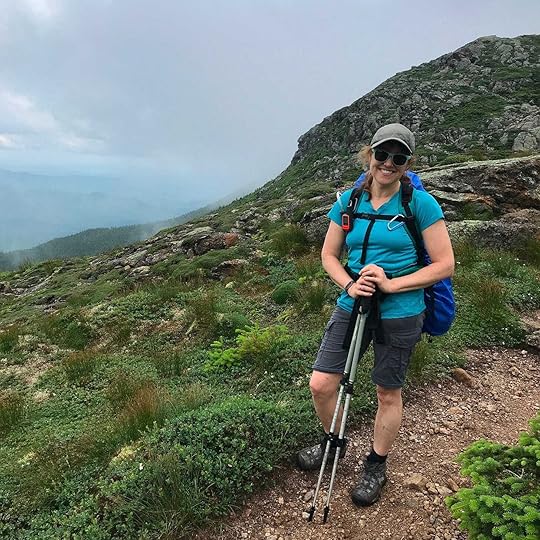 Meet your hiking snobbery coach. My pack is so fucking light.
Meet your hiking snobbery coach. My pack is so fucking light.Sarcasm coaching (for parents of teens). Let me use my five years of experience parenting teens to help you confidently channel your exasperation at your children’s idiocy into a form of “humor” that will drive them crazy while providing you with a cathartic release. In addition to helping you skillfully deploy classics like “So you’re just going to leave that right there, then?” and “Oh no. How will you ever survive?”, I’ll help you find your own voice as a sarcastic parent of teens: linguistic stylings, facial expressions, and delivery techniques that are yours and yours alone, for maximum teen annoyance.
Book coaching. Have you always wanted to write a novel or memoir, but you’re not sure how to start, where to find the time, or how to stay motivated along the way? I can help. No, seriously. I really can. Not that I can’t do those other things up there that I mentioned, especially the dessert one, but this is a kind of coaching I’ve actually already been doing for several years now. I love helping writers at any level bring their books to life, providing accountability, encouragement, troubleshooting, and hilarious anecdotes along the way. I also can provide developmental editing / editorial feedback for finished manuscripts. For the moment, I’m much better at all of this than ChatGPT is. And better looking, too. Interested? Drop me a line.
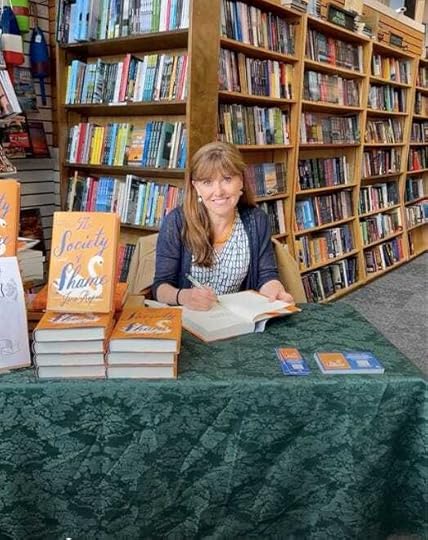 Write your book with help from A REAL LIVE AUTHOR!
Write your book with help from A REAL LIVE AUTHOR! So there you have it. My 5-prong plan to avoid penury and despair as AI nudges me not-so-gently out of a job. And like I said, if there’s a form of coaching you need that I haven't mentioned, let me know! I’ll ask ChatGPT how to do it, and get back to you as soon as possible.
Oh, wait! I actually just thought of one more:
Coaching business coaching. Are you worried about the implications of AI on your ability to make a living? This is the coaching service for you. As your coaching business coach, I’ll help you parlay your unique talents into a profitable coaching business. We’ll take an inventory of your skills and strengths to help you develop your offerings, then practice your coaching skills and create a marketing plan, such as spending 20+ years building a platform through blogging, publishing, and social media engagement. Before you know it, you’ll have a thriving coaching business. NOTE: This service is not available to people who want to become dessert, reading, hiking snobbery, parental sarcasm, or book coaches. You people are on your own.
I look forward to hearing from you!
All posts on my Substack are free, but writing is how I make my living. (In addition to all the coaching, obv.) If you enjoy my work, please consider upgrading to a paid subscription (As little as $4.16666 a month! Cheap!), buying my novel, or shopping for books via my affiliate store at Bookshop.org. Thank you as always for reading!

May 15, 2025
Old lady rants about AI, eats gruel
Back in March, I took myself on a little writing retreat in a woodstove-heated cabin just outside of Brattleboro, Vermont, to work on my new novel. (Which I recently sent off to my agent for feedback. Woot!) “Cabin” makes the place sound a little more rustic than it was. There was indoor plumbing, a refrigerator, etc. But I try to do my part to play to romantic notions of the writer’s life.
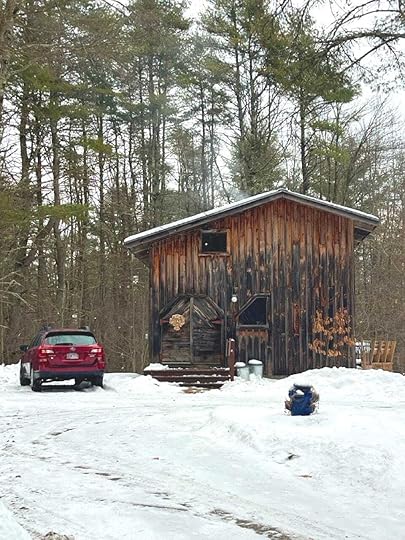 The l’il cabin in the woods.
The l’il cabin in the woods. One late afternoon during my stay, I went into Brattleboro, did some browsing in the shops, and headed to a local watering hole to sneak in last bit of writing over a glass of wine. (I don’t know why you don’t see more people with laptops at bars. Is it uncouth of me to do this? Am I breaking some unspoken bar rule? Because to me, it is a glorious way to spend the last hour of the workday.)
It was a tiny place, full of retro nautical-themed knicknacks and curios, which was a little odd given that we were about 100 miles inland, but OK. At one point, I overheard the bartender talking to the two other patrons in the bar about ChatGPT, and how awesome it was.
Being a middle-aged lady who has no fucks to give and no longer has any fear about inserting myself into conversations in public places (wait; I’ve sort of always done this?), when the bartender came over to ask if I wanted anything else, I made an innocent, lighthearted comment about AI being satan or something along those lines. When he asked why I felt this way, I explained that AI was chipping away at my ability to make a living as a copywriter and threatening my art-school-bound child’s hopes of being a professional illustrator. Also, it was going to make people’s brains atrophy, because they would no longer have to think.
(Be sure to sit next to me if you see me in a bar! I’m fun!)
The bartender, who was about 25, said that we—meaning humans—just had to think of AI as a “thought partner,” and that he, for one, was excited about “the post-human future.” (UGH.) He also told me that pretty much everyone he knew at his college, where he was getting his degree in something to do with AI and technology, used ChatGPT to write papers—including his girlfriend, who was majoring in English.
This was the point at which I said, yes, come to think of it, maybe I will have a second glass of wine.
After I finished it, I went back to my cabin in the woods, stoked the woodstove, made myself a bowl of watery gruel, and took my ancient bones to bed.
Hahaha. Just kidding about the gruel.
Honestly, though, I don’t think I’ve ever felt as old as I did, sitting there in that weird little bar, listening to that fresh-faced and slightly-too-confident-for-his-age-young man (who probably reads Ayn Rand—or ChatGPT summaries) talking about the glories of the coming AI age.
My friends, I am sorry to be an old poop, but I am not excited about AI, and I don’t like the way it is already starting to transform our society, culture, and economy.
Maybe I wouldn’t have been excited about it at age 25 either. I mean, I think I still would have been pissed off about the fact that generative AI is theft. (I just had to put that in bold type, because most people don’t seem to get it, or give a shit.)
Here’s what I mean: AI crawlers search the web—I picture them as creepy little robot spiders—gobbling up the work of authors, photographers, illustrators, and other creators, then remixing and regurgitating it in response to people’s queries.
Are the makers of the work asked if this is OK? Are they given credit? Are they PAID? No, no, and no. And yes, in case you were wondering: Pirated copies of all three of my published books were used to train ChatGPT and Meta AI.
What’s nuts to me is that most people don’t seem to care—even creative types. I’ve seen authors using AI to create their book covers, art directors/designers using it in their web designs, and ad agencies creating (and touting!) whole campaigns made with AI art. I guess everyone’s just cool with plagiarism? And putting artists out of work? ‘Cuz AI is free and really neat?
Apparently.
But what really rattles my ole bones about it all—and what makes me feel genuinely sad—is the fact that AI is increasingly being used in place of human intellect, creativity, and imagination. And a whole lot of people seem to be OK with this.
Certainly a lot of college students are, which is beyond depressing. Honestly, if you’re using ChatGPT to write your papers for you, what is the point of even going to college?
Writing is thinking! Rarely does someone come to the blank page with ideas or arguments or stories already fully formed in their heads, which they then simply type out. Of course not. They shape and hone their ideas—and develop new ones—through the writing process. Fun fact: the etymological root of “Essay” is from the Middle French “essai” meaning “to try” (“essayer” in modern French.) As in, to try to reason through and understand and express something—BY WRITING IT, NOT BY ASKING CHATGPT TO DO IT FOR YOU, YOU LAZY FUCKS.
Look, I’m not a total luddite. I recognize that AI is pretty damned amazing—and getting better all the time. I’m sure my hapless former ChatGPT intern, Tyler Hotchkiss, for example, has gotten much better at his job, with help from all those creepy web crawlers, and the prompts and questions users continue to feed him. In fact, he’s probably gone one to replace several hundred professional writers. They all work at Trader Joe’s now.
I also totally see how AI is an incredibly powerful tool when it comes to stuff like medical diagnoses and number crunching and research. Not to mention “automating routine tasks, freeing your employees for higher-value work.” I’ve written about this countless times in the copywriting work I do for tech companies. But one has to ask: How many of those employees will actually be kept around to do that “higher value work” and how many will end up having to work at Trader Joe’s with the writers?
Think I’m exaggerating about people starting to lose their livelihoods to AI? I’m not. It’s hitting freelancers hard, and even seems to be affecting the job market for recent college grads. And for us Gen-X creative professionals, AI is accelerating the rate at which our skills and expertise are quickly becoming obsolete—right when we’re at the height of our careers.
But hey, at least the tech bros are getting rich.
Like I said, maybe if all this had happened when I was 25, I wouldn’t be such a pessimist about it. After all, that was the age I was when the internet was starting to transform the whole media and advertising landscape. And while I can’t say I welcomed the change—because I knew it was going to have repercussions, and that certain developments were definitely not good for humanity (and because I’ve kind of been an old woman for my entire life)—I felt fully willing and able to adapt and thrive. And I was not at all worried about my ability to continue to make a living. Now, I am. In fact, I’m already having a harder time at at it than I did for the first 12 years of my freelance career.
It would, of course, be nice if I could make a living Substacking or writing books—things AI is not yet able to do well—but it’s unlikely. (Sorry to ruin those romantic notions of the writer’s life you might have. Should I talk more about the cabin with the wood stove?)
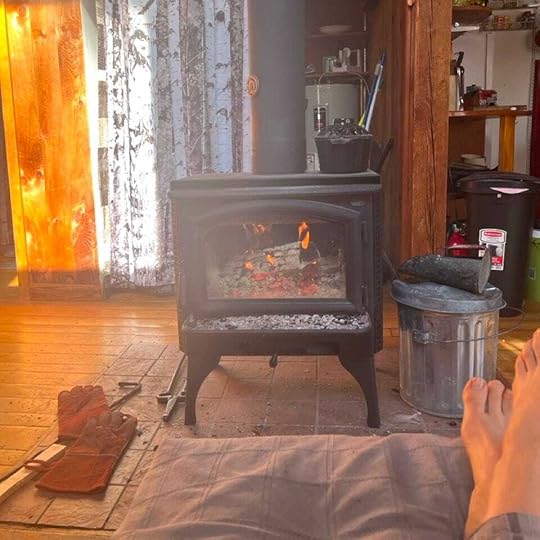
I don’t know, guys. I don’t want to be one of those grumpy people who rants about all the ways the world is going to hell. And yet…and yet…AI feels like an especially troubling technological advance—much moreso than the internet or smartphones or any of the other gamechangers I’ve seen in my lifetime.
But the horse has left the barn, and there’s nothing I can do to shove it back in. So I suppose all I can do is keep advocating for and valuing (in dollars and attention) human thought and creativity. And telling my soon-to-be-college-student kids that if they use ChatGPT, so help me god, I will not continue to pay their tuition.
And if all that becomes too dispiriting, well, I guess I’ll try to channel the optimism of my 25-year-old bartender friend, embrace the post-human future, and be the best damned Trader Joe’s employee I can be.
All posts on my 100% human-authored Substack are free, but writing is also how I attempt to make a living, in defiance of our robot overlords. If you enjoy my work, please consider upgrading to a paid subscription (As little as $4.16666 a month! Cheap!), buying my novel, or shopping for books via my affiliate store at Bookshop.org. Thank you as always for reading.
P.S. My friend Heidi Pitlor recently wrote an excellent post about the dangers of AI that you should check out.

April 28, 2025
Five books to make you laugh
Hey there! I just got back from New York, where I attended the award show for this year’s Thurber Prize in American Humor in writing, as one of the three finalists. [Pause for applause]. Thank you. Thank you so much. It was an amazing thing to be nominated, and even though I didn’t win—that honor went to WaPo humor columnist Alexandra Petri, for her very funy book Alexandra Petri’s U.S. History (more on that below)—I had a blast, and some excellent trout for dinner.
I also realized that it is high time I put together a list of some of the funny books I’ve read recently — and links to them on Bookshop.org, where every purchase supports independent bookstores. If you didn’t make it out to an indie bookstore for Independent Bookstore Day on Saturday, here’s another chance to support the more than 2,000 wonderful non-billionaire, non-penis-rocket-owning, non-Trump-ass-kissing booksellers in this great land of ours.
And here is also your chance to up your daily laughter output. Because, as we all know, laughter is a powerful antidote to things like spiraling into despair because your country has fallen into the hands of an authoritarian moron. Remember: the only kind of laughter fascists and other bad guys like is the evil kind. So, laugh merrily in their direction. They hate that.
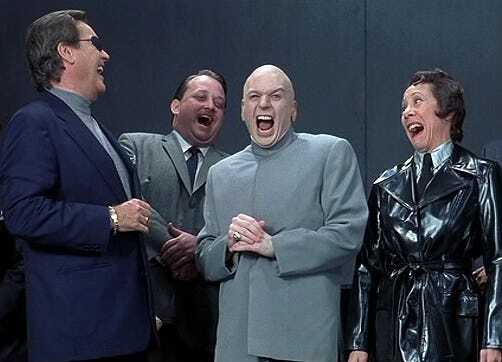 Evil laughter
Evil laughter
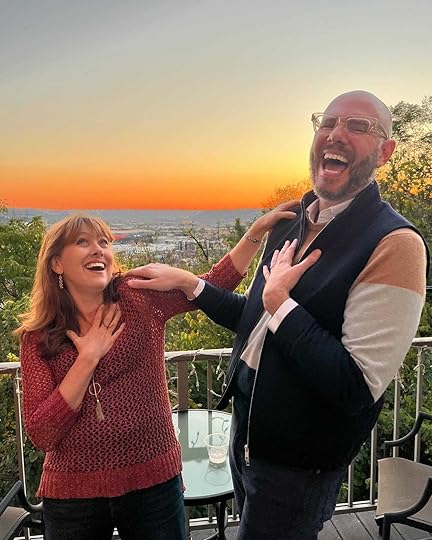 Non-evil laughter — me and Steven Rowley, author of my first book recommendation below.
Non-evil laughter — me and Steven Rowley, author of my first book recommendation below.Now, without further ado, here are five funny books I’ve read recently. Click any cover or title to get it on Bookshop.org.

The Guncle, by Steven Rowley
This Thurber Prize winner by the generous and lovely Steven Rowley is both funny and moving—a combo that I admire so much in a book. “Guncle” is a portmanteau of Gay and Uncle (portmanteaux feature prominently in the book, which is one more reason I love it, and also it gave me an excuse to unnecessarily use the French plural of the word just then). The Guncle in question is former sitcom star Patrick O’Hara, who unexpectedly ends up taking care of his niece and nephew at his Palm Springs home when their mother—his sister-in-law and best friend—dies. The clash between Patrick’s lifestyle and the needs of his six- and nine-year-old charges is frequently hilarious. Quips and bon mots abound, and there are many genuinely poignant moments as Patrick confronts his own grief and and considers how to move forward.
Rating: Two cocktails, a swimming pool, and a seasonally inappropriate Christmas tree.
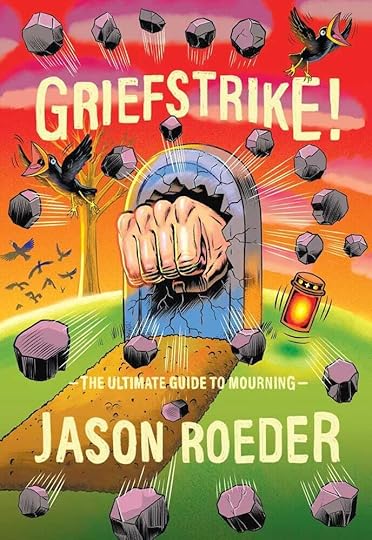
Griefstrike by Jason Roeder
Jason Roeder was my fellow Thurber Prize loser, and a lovely guy. His nominated book, Griefstrike is a humorous guide to mourning, which he wrote in the wake of his mother’s death. It’s a parody of a grief manual, but also has the occasional “sincerity corner,” where Roeder has little heart-to-hearts with the reader. (And they’re funny, too, but in a different way.) Sections/chapters include: “How much am I allowed to blame God?” with a state by state breakdown of whether you can legally blame God for your loved one’s death. (Massachusetts: “Fuck yeah, you’ll love it.”); “The Grief Calorie Counter” (Returning funeral shoes to Marshall’s: 90 calories); and “Grieving Visualization Power Postures” all of which begin standing nude in your sunroom. If you’ve lost close to you someone recently, or expect to in the future (you will), keep this on hand for some cathartic, mucus-y sob-laughter.
Rating: Four sympathy cards and two hundred and six “I’m so sorry for your loss”es on Facebook from people you maybe knew in high school. Or was it college?
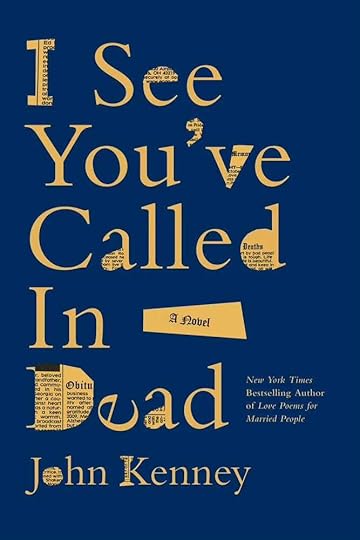
I See You’ve Called in Dead, by John Kenney
MORE GRIEF! Oh my god, it’s almost as if death is funny. It is! It is! Comedy and tragedy are inseperable if you want them to be—and you should. I had the pleasure of being asked to blurb this novel by Thurber Prize winner (For his novel Truth In Advertising) John Kenney, and to quote myself, it is “wise, wry, and heartfelt.” Obituary writer Bud Stanley is in a deep rut after his wife leaves him, and accidentally publishes his own obituary, which costs him his job. It’s only once he gets up close and personal with death—namely by attending the wakes and funerals of strangers—that he figures out how to embrace life again. The humor is subtle and perfect, and you really will come away from this book with a greater appreciation for the precious, fleeting time we get on this earth.
Rating: 4.5 stars (Sometimes the tride and true works just fine.)
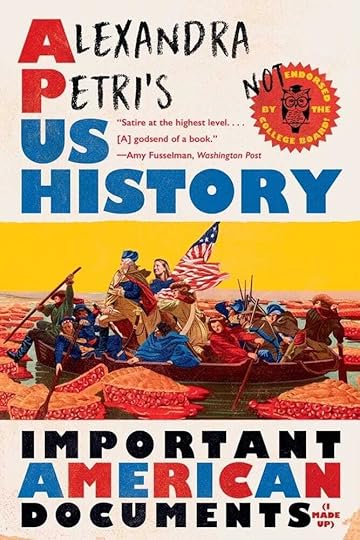
Alexandra Petri’s US History: Important Amercan Documents (I Made Up), by Alexandra Petri
NOT ABOUT GRIEF! This is the kind of book you want to keep on your beside table and pick up and read a piece or two from when it’s too late to read the other book you’re reading, because you wasted forty-five minutes doomscrolling through the fascism, and now it’s almost eleven, and you really should go to bed, but you still want to read something, just really quick. (And also, the doomscrolling has made you sad and you want to laugh.) This Thurber Prize stealing winning book is compendium of humor pieces about American history and culture, including “John and Abigail Adams Try Sexting,” “An Oral History of the Oklahoma! Exclamation Point,” “Ayn Rand’s The Little Engine that Could but Preferred Not to” and “The Team at Build-a-Bear Responds on the Thirteenth Anniversary of 9/11.” I laughed out loud multiple times, especially at the part in “An Oral History of the Constitutional Convention” where Gouverneur Morris, who is supposed to be taking notes, starts doodling a man-sized rabbit and passes the drawing around to the other delegates and asks them to weigh in on what kind of clothes it should be wearing. It’s that kind of book.
Rating: A man-sized rabbit and a Thurber Prize
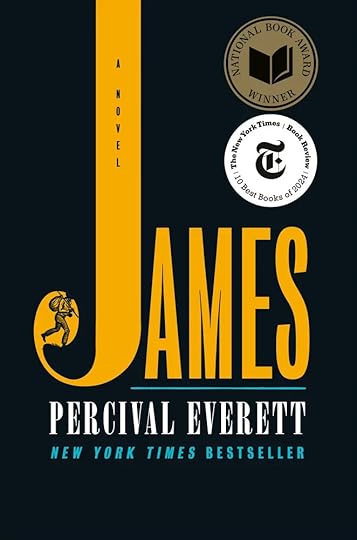
James by Percival Everett
I’m only about eighty pages into James, which reimagines the story of Huckleberry Finn from Jim’s point of view, but I am absolutely riveted. I expected the book to be profound and important and thought-provoking and all of the other things the reviewers have said about it. BUT I did not expect that it would also be quite funny. One of the core sources of this humor is how Jim and other enslaved people, for their own safety and self-preservation, act scrapingly subservient, superstitious, and dim when they’re in the presence of white people, speaking in the sort of broad dialect attributed to Black people in Huckleberry Finn and other books of the time, but speak the King’s English and act like the intelligent, complex, and perceptive human beings they are when they’re amongst themselves. It’s a satrical stroke of genius.
Rating: Liberty and justice for all
And if none of these titles tickle your fancy, some other funny books I recommend include Straight Man by Richard Russo, Cold Comfort Farm by Stella Gibbons, My Sister The Serial Killer, by Oyinkan Braithwaite, and The Girl With The Lower Back Tattoo by Amy Schumer. Oh yeah, and there’s this one, too.
What are your favorite funny books? Please add in the comments below. Happy (non-evil) laughing.
All posts on my Substack are free and publicly available, but writing is also how I attempt to make a living. If you enjoy my work, please consider upgrading to a paid subscription (As little as $4.16666 a month! Cheap!) or buying my book. Thank you.

April 8, 2025
We all need a little shelter from the storm.
Well hello there. It’s been three weeks since my last confession post, but it feels like a lifetime. So many fresh hells and abominations since then! A veritable smorgasbord! People deported and abducted without due process, war plans shared by morons in Signal chats, stock markets clobbered, universities and law firms extorted, history expunged from websites and museums.
It is hard not to feel completely overwhelmed by what is happening, and what may be ahead. I try so very hard to remain hopeful—to remember to feed that thing with feathers that is apparently perched in my soul. (Ew?) But it is not always easy. Lately, in fact, it has been quite difficult. The abduction of Rumeysa Ozturk a couple of weeks ago, right near the playground we used to take our kiddos when they were little, marked something of a turning point for me—a stark confirmation of just how dark things have gotten, and how much darker they may get
At the same time, I find myself being much more keenly aware of—and thankful for—the sources of refuge in my life: the places, people, and activities where I can catch a break from anxiety and anger and intrusive thoughts such as: oh my god are we headed toward martial law and a total breakdown of society and should I stock up on rice and gasoline for bartering with the hordes of armed citizens soon to be roving the streets of my quiet, suburban town?
Those sources of refuge include but are not limited to: laughing with my kids and husband, walking in the woods, making and eating good food, doing crossword puzzles, reading, rock climbing, spending time with friends, and mocking our cats.
But the biggie for me is writing—via this here Substack, yes, but even moreso via the new novel I’m working on. Like my last book, it’s funny, and on the lighter side—so, a nice escape for me and hopefully for future readers—but with some serious themes and emotional truths running through it. I am totally absorbed in the work (which is part of why I haven’t posted here in a while) and am closing in on a decent draft, which I will soon share with my agent and some beta readers.
I don’t think I’ve ever felt so keenly, consciously grateful for writing as I have felt over these past few months—even though I’ve been writing avidly ever since I was first capable of it.
My mom has been going through old slides and photos of late, and sent me this one, in which I seem to be waiting patiently for the muse to enter my body and guide my hands to the keys of my parents’ electric typewriter.

I don’t know what I was working on here. I would say that maybe it was my first major work of nonfiction, The Sticker Sensation: a Fun Guide to Collecting Stickers, but I think I wrote that when I was a little older. The “cool” handwriting on the cover was something I believe I cultivated in fourth grade.

It’s also possible—and would explain the closed eyes—that the photo captured me in midst of teaching myself how to touch-type, which I did, from a book. (I was a strange child.) I still remember the first phrase I learned to type without looking, using the home row keys: Dad had half a shad salad.
Ironically, I don’t remember ever thinking as a kid that I wanted to be a writer when I grew up. This in spite of the fact that I was constantly doing it, whether it was writing in my diary or lightly plagiarizing Shel Silverstein or touch-typing didactic guides to popular children’s hobbies. Jobs like archaeologist, airplane stewardess (the correct term at the time!), actor, and dancer were all much higher on my list.
In fact, I actually had a brief career as an actor / model, doing professional theater and commercials, and modeling for catalogs and department store circulars. Check out my cringey 80s headshots…
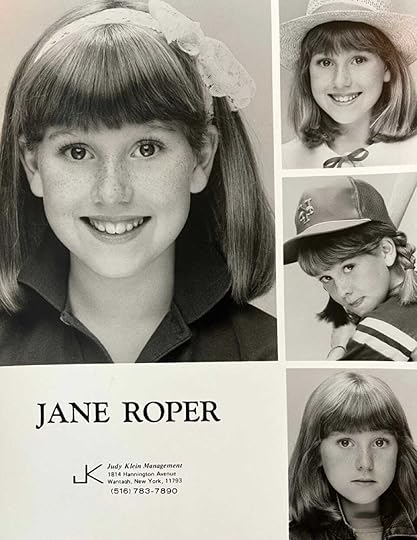 I had immense range.
I had immense range.…and my adorable original SAG card!
 Elon may have my social security number, but you can’t!
Elon may have my social security number, but you can’t!As a teenager and young adult, my career dreams shifted from performing (I retired at 12, due to waning interest and braces) to politics and activism and vague designs on “something involving travel.” But no matter how hard I rowed in that direction, I was borne back ceaselessly into the past, to the thing that had made me feel most anchored, contented, and fully myself as a child.
Writing was my soul’s home. And it still is. It can be thankless and crazymaking and tedious as hell. But when I’m doing it, I feel safe. Calm. Fully in the moment of whatever world I’m creating or line of thought I’m exploring. It’s the realest thing I do.
I can’t turn away from what is happening to our country. I can’t stop speaking out (did you protest on Saturday? Wasn’t it amazing?). And I can’t help feeling the anger and sadness and anxiety. That would be impossible.
But I will keep taking shelter from the storm where and when I can (how lucky I am to be free to do that). To refuel and find joy. To stay rooted. And to make sure that thing with feathers (ew?) doesn’t croak.
I hope you’ll do it, too.
All posts on this rambly and sometimes surprisingly earnest Substack are free and publicly available, but writing is how I make my living. If you enjoy my work, please consider upgrading to a paid subscription (As little as $4.16666 a month! Cheap!) or buying my book. Thank you.
P.S. Here’s Bob Dylan singing Shelter from the Storm, which is one of my favorite songs of his. Maybe your shelter, like his, is some chick with silver bracelets on her wrists and flowers in her hair. Whatever works!
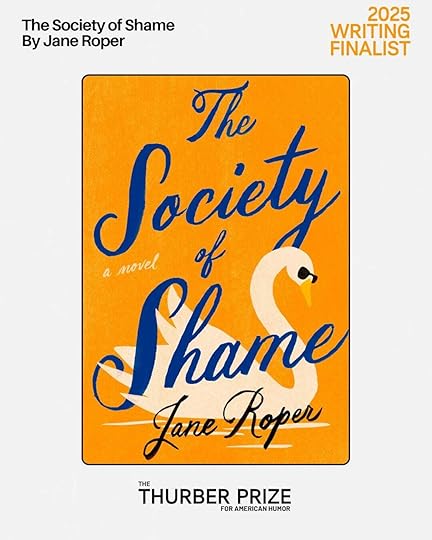
March 16, 2025
The story has changed
Buckle up, buttercups, because I’m gonna get a little academic on your asses in this post. A little philosophical, a little political, a little evolutionary. A little bit country, a little bit rock and roll. I’ll make it quick(ish), and there’s no test at the end. I promise.
It’s just that I’ve been feeling awfully unsettled of late—as I think many of us are—and I’ve been trying to get a handle on why. I mean, I know why. Our country is being taken over by an authoritarian regime, the stock market is tanking, and it’s not clear just how much worse things are going to get. (Significantly, I fear.)
But there’s something much more profound happening, too, and I think it’s why the current political situation is so difficult on a psychological level for many of us.
It has to do with the very thing that makes us human.
I was an anthropology major in college. To this day, I’m a sucker for books about evolution and ancient human civilization. Over the past seven weeks, I’ve been thinking a lot about one such book, which I gobbled up when it came out ten years ago: Yuval Noah Harari’s Sapiens: A Brief Human History of Humankind.
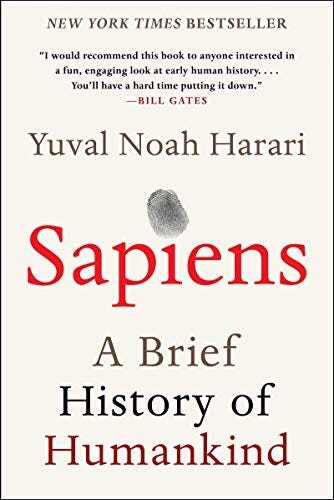
In Sapiens, Harari offers up his explanation for why homo sapiens came to be the dominant homo species on earth, and why we’ve been able to do what other no other species has—create cities and kingdoms and countries and whole civilizations.
What it comes down to, he says, is our unique cognitive capacity for imagination. We’re the only species with the ability to make up and communicate fictional stories.
As he puts it:
Many animals and human species could previously say ‘Careful! A lion!’… Homo Sapiens acquired the ability to say, “The lion is the guardian spirit of our tribe.”
Our ability to share and buy into those stories, Harari argues, is what makes human civilization as we know it possible:
“Fiction has enabled us not merely to imagine things, but to do so collectively. We can weave common myths such as the biblical creation story, the Dreamtime myths of Aboriginal Australians, and the national myths of modern states. Such myths give Sapiens the unprecedented ability to cooperate flexibly in huge numbers. Ants and bees can also work together in huge numbers, but they do so in a very rigid manner and only with close relatives. Wolves and chimpanzees cooperate far more collectively than ants, but they can do so only with small numbers of other individuals that they know intimately. Sapiens can cooperate in extremely flexible ways with countless numbers of strangers. That’s why Sapiens rule the world, whereas ants eat our leftovers and chimps are locked up in zoos and research laboratories.”
He goes on to write about all kinds of stories humans tell, and the systems and institutions we create based on those stories. Money, for example. We’ve all bought in to the story that certain pieces of paper and metal with particular numbers and designs on them have value relative to other things—goods, services, experiences, etc. And, moreover, that they have value relative to money from other defined sections of land on the planet. It’s kinda crazy when you think about it.
Money is a story. Borders are a story. Religions are stories. Class and caste and tribe are stories. The concept of superiority based on race or gender (bad word! shh!) is a story, as is the concept of human rights. Values and belief systems and systems of government are stories.
We very smart apes buy into these stories and countless more, choosing some of them intentionally, being born into others. Some are shared by massive populations, others by sub-populations within them. They undergird our reality, whether we’re conscious of them or not.
National identity is a story. America is a story. And until recently, I didn’t realize just how present that story was (is) in my psyche.
I’m not what you’d call a patriotic person. I’ve never liked pledging allegiance, I don’t love standing for the national anthem, and phrases like “the greatest country in the world” make me roll my eyes so hard I can see the person standing behind me. If you ever catch me chanting “U.S.A.” it’s because I’ve been possessed by a demon. Please keep your distance and call the relevant authorities.
I am just too cognizant of our country’s many sins and shortcomings to get all misty about the stars and stripes. Also? There are a lot of great countries in the world. And also? What even are countries, man? Borders are just a story perpetuated by power-hungry men. We’re all just one big human family. Pass the bong.
But it turns out I do, in fact, carry a certain story of America around with me, which I learned from a young age. You probably carry it—or some version of it—around with you too.
That story says that we believe in laws, not decrees. Democracy, not autocracy. Throwing off the yoke of tyranny is our creation story. We believe in electing leaders, and that those leaders should use their authority thoughtfully and deliberately, bounded by laws and norms. We are not a country where, for example, its ok for leaders to punish people or institutions whose opinions or actions they don’t like, or go around the constitution to get things done.

The American story also says that freedom of speech is sacred. Freedom to protest, to publish, to dissent, to express ideas of any stripe is central to who we are. In America, people are not arrested and detained for their political beliefs. We don’t make lists of words that shouldn’t be used.
Another central part of the story of America, at least since the Second World War, is that we should be a force for good in the world. (I know, there are a lot of holes to be poked in this, but just go with it for now, mmmK?) We support and, if necessary, defend other countries that share our belief in freedom and democracy. We do not threaten or bully or disrespect their leaders. We are loyal to our allies, especially those nearest and dearest. We do not cozy up to dictators.
Finally, we believe in using our wealth, and the talents of our people, to accomplish great things in the realms of science, medicine, technology, education, humanitarian aid, conservation, and the arts—not just for the betterment of our own country, but the whole world. We respect the institutions and experts and workers who make all of these things possible.
This is a story that millions of us collectively share, whether we’re aware of it or not. It forms the scaffolding of our nation. It knits us together as not just a random bunch of homo sapiens occupying the same land mass, but a country. Is it an idealized, aspirational story? Hell yes. Are there instances when the reality of what we do is at direct odds with what we profess to believe? Absolutely. Countless instances. But it’s our story nevertheless.
Over the past decade, though—and then with truly alarming speed over the past two months—the story has changed.
And this is why I think what’s going on right now is much bigger than the sum of the various terrible things happening—and why it feels bigger, too. This is not just “these are problematic developments.” This “The lion is the guardian spirit of our tribe” being changed, after two hundred and fifty years, to “The naked mole rat is the guardian spirit of our tribe.” (No offense to naked mole rats.)
We, the homo sapiens of America, are being told that there’s a new American story, now. It’s authored by a bunch of incompetent fascists and Christian nationalists and tech bro billionaire creeps and the many Americans who support them. In this story, the president is more like a king, following the law is optional, loyalty is more important that competence, allies are expendable, science and universities and the press are suspect, and the government can ban “ideologies” or disappear people that they disagree with.
And that’s, like, a really different story.
It’s no wonder so many of us are feeling not just unsettled, but disoriented and shaken to the core.
Some people are eagerly embracing the new story, either because it’s in their best financial and political interest to do so, or because they actually like it.
But it’s a supremely shitty story.
My fellow homo sapiens (and any homo neanderthalenses reading this—good for you!) we need to fight like hell to hang on to the old story. We need to shout it in the streets (I like using a bullhorn for this myself) and on the Substacks and everywhere else. And if we’re lucky enough to keep it, we need to live up to it more completely and consistently—to actually ensure liberty and justice for all. To become a more perfect union.
God damn, listen to me, all patriotic.
It turns out you just don’t know how much a story means to you—how elemental it is to your view of the world—until someone comes along and tries to change it.
Those someones can go to hell.
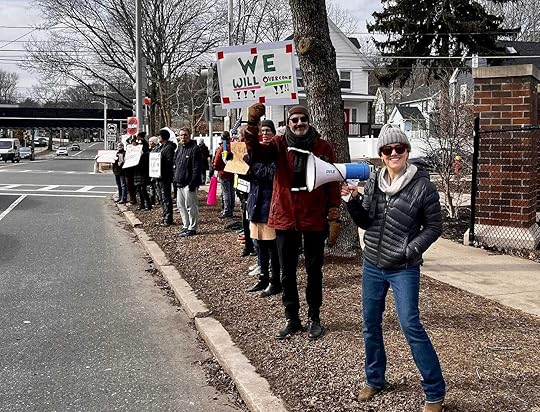 Fig. 1 - Homo sapiens Americanus with bullhorn
Fig. 1 - Homo sapiens Americanus with bullhornAll posts on this apparently patriotic Substack are free and publicly available, but writing is how I make my living. If you enjoy my work, please consider upgrading to a paid subscription (As little as $4.16666 a month! Cheap!) or buying my book. Thank you.




